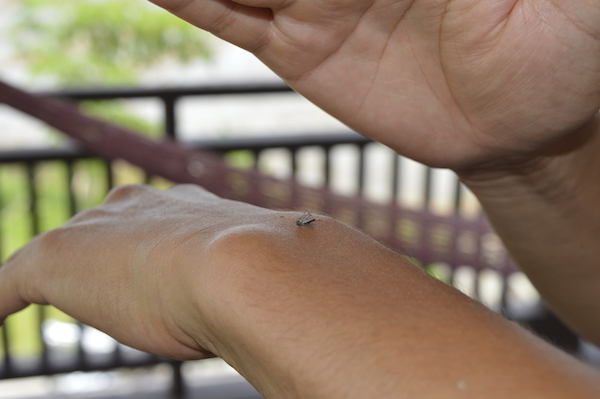Every year, customers come into garden centers looking for plants that will repel mosquitoes. The shoppers want something they can plant in the ground or in pots around their deck, patio, fire pit or porch.
You only have to plug “mosquitoes and plants” into Google and you’ll get a bunch of articles claiming this or that plant will protect you from the buggers. Among them: lavender, lemongrass, basil, mints and citronella geranium.

This search for assistance from plants is not totally without merit. Unfortunately it’s not the plants, but rather the oils they contain that do the repelling.
A lot of shoppers want lemongrass (Cymbopogon citratus), the popular ingredient in Asian dishes and teas, thinking it has mosquito-fighting attributes. It is related to (but more available than) citronella grass (C. nardus, C. winterianus). Compared to citronella grass, lemongrass barely contains any insect repelling oil.
Crush and smear
Citronella grass contains citronella, which we grew up knowing it was an insect repellent. The oil is extracted for use in candles, garden torches and other citronella-scented products, which can be effective at repelling insects.
The only way these scented plants and herbs work (if at all) is to tear or crush the leaves to release a miniscule amount of oil and rub them on your skin. Citronella-scented geraniums are popular because of their name, but the experts say they don’t really have any repellent powers.
Usually, the best protection comes from applying EPA-approved insect repellents. The Centers for Disease Control and Prevention recently added lemon eucalyptus oil to its list of ingredients for insect repellents. That list includes the well-known DEET, along with other chemicals.
What to do
Serious and sometimes deadly diseases from mosquitoes – and these days, ticks – warrant our concern and protection. West Nile, Lyme disease, encephalitis, equine encephalitis are just some of the worries, along with the risk of infection from bug bites.
Some pest control companies advertise organic treatments, which usually contain a mix of garlic oil, herbs and other natural ingredients. If hiring a company, ask about the products used and possible impact on pollinators and other desired insects and birds. Also ask about timing of treatment, another factor to consider when concerned about the presence of pollinators. A few things we can do in our landscapes:
- Eliminate any standing water, such as low spots in the landscape.
- Empty water that remains in saucers under planted containers.
- Flush out and refill birdbaths daily.
- Ticks like to hang out in tall grass, so keep the lawn mowed and weeds cut.
- If ticks are a concern, be sure to examine yourself, the kids and pets after being outdoors.
- Wear clothing that covers the arms and legs. Tuck pants into socks if working or hiking in potentially tick-infested areas.